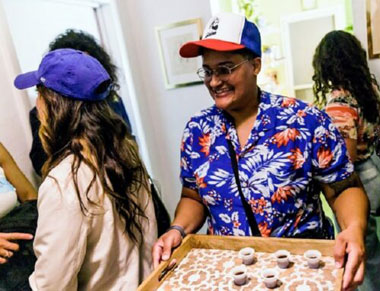
Eric Garcia, a.k.a. "Uncle Scotchy," plays the blues and tells stories in Juggerknot Theatre Company's production of "The Blues Opera." (Photo: Juggerknot Theater Company)
Eric Garcia really got to know his father while bathing him.
The older man had grown sick to the point that he needed help performing everyday tasks. But at least he was able to talk. And during those bathing sessions, “he told me some horrible sh-t,” Garcia recalled.
This was just one memory that Garcia shared during a recent performance of “The Blues Opera,” a one-man immersive, interactive play that is running through the end of June in Miami.
However, do not expect to simply sit back and watch. In fact, at one point, you may become the center of attention as you tell a story.
But the focus of the afternoon or evening will be on Garcia, a.k.a. “Uncle Scotchy.” He will share stories about his parents and him while playing games with you and nine other audience members, who portray invited guests at his home.
“The Blues Opera” is a touching, bittersweet, funny, and fun non-traditional theatrical experience. The piece represents the kind of non-traditional live theater that Miami’s experimental Juggerknot Theatre Company tackles.

Adele Robinson is Uncle Scotchy's "friend." She arrives to get everyone together for game night. She also serves as hostess and guide. (Photo courtesy of Scott McIntyre)
Actually, the experience begins when you arrive outside a bakery in Miami’s Little Havana neighborhood. There, a Juggerknot representative will meet you and you will get a free croqueta from the bakery.
Once everybody is checked in, Uncle Scotchy’s friend, Adele Robinson, will show up to take you to his home. Everybody makes the short walk to Garcia/Uncle Scotchy’s house. There, you will find him sporting a black tank top and black pants. Tattoos cover his arms.
Once you are inside, Robinson will invite you to take a seat in the living room. In addition, she will serve you a Kentucky Owl Scotch whisky on the rocks (Garcia’s love of Scotchy earned him his nickname). If Scotch is not your thing, Perrier on ice is also available.
Then, “Game Night” begins. Specifically, one at a time, participants toss a soft fuzzball onto a “Wheel of Fortune” like board painted on the wall.
What happens next will depend on which spot on the board you hit. Also, different spots on the board correspond to different point values. You will want to keep track of your score; at the end, you might win a prize as the winner.
But everybody is in for a treat, as you get to hear Uncle Scotchy play music as though he were a one-man-band. He plays a harmonica in a wire holder around his neck. At the same time, he picks and strums his guitar, switching between harmonica and vocals.
Garcia plays flawlessly and sings with authentic-sounding emotion that nicely complements his stories. Speaking of his true tales, he tells them in a sincere-sounding, somewhat subdued voice. Specifically, the personal and raw stories relate his time as a caregiver to both of his parents.

Blues musician and storyteller Eric Garcia, a.k.a. "Uncle Scotchy," plays his harmonica during a moment from "The Blues Opera." (photo courtesy of Scott McIntyre).
Certainly, what happened to both of them is sad. However, apparently enough time has passed since their deaths that Garcia no longer tears up while talking about their illnesses. However, he does get angry at one point about a moment from his past.
The rage sounds raw, and what he does next may startle you. Indeed, this is the most intense moment you will experience through the course of the afternoon or evening. Otherwise, Garcia comes off as a pleasant-sounding man with a joyful smile, gray hair, gray beard, glasses, and tattoos. One of them depicts his mother’s smiling face.
You will hear Garcia/Uncle Scotchy relate pleasant memories, such as when his folks danced to a song. His mother, Sande, did not understand Spanish, and so his father, Victor, translated the song’s words into English for his wife.
But you will also hear upsetting moments from Garcia’s past. For instance, Sande’s Alzheimer’s reached a stage that robbed her of the ability to perform everyday tasks. It became Garcia’s job to wipe her butt. But at this point, Sande no longer recognized her son, and so she freaked out.
“They’re not patients, they’re victims,” Garcia tells us, referring to people stricken with Alzheimer’s disease. He added that at one point, Sande no longer recognized Victor and attacked him.
Sande experienced lucid moments, but they were not necessarily pleasant ones. For example, she once grabbed her son’s arm with her sharp nails and made him promise that if she reached the point where she could no longer remember things, he would kill her.
While Sande lost her memory, “I couldn’t take her from him,” Garcia said, referring to his mother and father.

Eric Garcia tells true tales about caring for his parents. Theatergoers move through different rooms of a house in Little Havana. (Photo: Scott McIntyre).
Through his words, Garcia paints a vivid enough portrait of his parents that we get an idea of what they were like. Also, we gain a clear idea of what it is like to be a caregiver. His parents were “remarkable people who died very unremarkably,” Garcia tells us. He added that before he dies, he wants to feel that he did something to make his parents proud.
Judging from the care and skill with which Garcia is presenting his story, it is a good bet that they would be thrilled with him.
“The Blues Opera” is unflinchingly honest in its depiction of caregivers. And while parts of it are sad, the show contains enough humor and upbeat music to keep us from becoming depressed. The piece does not suffer from even one wasted moment.
Of course, Garcia/Uncle Scotchy is hardly presenting “The Blues Opera” by himself.
For instance, Ana Margineau, an artist who directs immersive theatrical pieces nationally and internationally, directed “The Blues Opera.” She keeps our attention by, for instance, having Garcia disappear at the end of a scene, leaving us wondering where he went.
Then, we hear a voice indicating that we should follow Robinson to the place where Uncle Scotchy awaits us. Also, under Margineau’s direction, the show never lags. And she nicely balances still moments with movement, ensuring that the show never suffers from stasis.
Meanwhile, a team of artists, including a costume and scenic designer, provide just the right ambiance and amount of detail to heighten Garcia’s storytelling. In particular, family photos grace the walls of the home, which are lit invitingly and realistically.
The colors in the home included black, white, blue, and gray. Black and white could symbolically contrast the upbeat moments from the somber ones in Garcia’s past. Meanwhile, the color blue makes sense, partly because Garcia is a Blues man who plays and sings that style of music. Also, certain moments in Garcia’s life certainly left him feeling blue.
And you may leave “The Blues Opera” with a case of the blues as well. “We promise you’ll leave changed and learn how to embrace your own Blues,” Juggerknot Theatre Company promises on its website.
“The Blues Opera” runs through June 26, although some performances are sold out. Producers have added additional shows on Wednesday nights. General admission costs $85. Garcia asks that you wear comfortable shoes, and bring a picture of your mom, or “whoever you think of as your mom. It can be on your phone.” Also, Garcia asks that participants arrive 15 minutes before show time. Masks are not required, but highly encouraged. You will find out where to go after you purchase tickets. To do so, go to juggerknottheatrecompany.com/the-blues-opera.
 MAIN MENU
MAIN MENU

